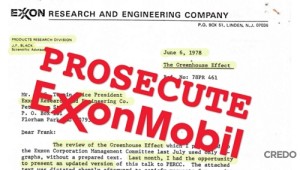
The oil giant may have its man of choice in the White House and its old boss as Secretary of State, but Exxon is once again coming under pressure over its stance on climate change.
Exxon made news late last month when it sent a letter to Donald Trump urging the new President not to pull out of the Paris Agreement, arguing it was an “effective framework for addressing the risks of climate change” and the “first major international accord” to reduce greenhouse gas emissions.
At the time one Exxon Mobil official said: “It is prudent that the United States remain a party to the Paris Agreement to ensure a level playing field, so that global energy markets remain as free and competitive as possible.”
By publicly arguing that the US should stay in the Paris Agreement, the oil giant may have thought it had done enough to ward off its critics on climate change.
But it was wrong.
The Financial Times is reporting that, once again, “a growing number of investors are calling on ExxonMobil to report on the possible impact of climate policies on its business,” in the run up to the company’s AGM at the end of May.
The shareholders, led by the New York State pension fund and the Church of England, are seeking to force Exxon into discussing the implications for its business of a quicker transition to a renewables future than the company has publicly projected.
The fundamental flaw in Exxon’s position is that publicly the oil giant may be telling Trump to keep America in the Paris climate agreement, which limits greenhouse gas emissions to “well below” 2 degrees, but privately it carries on investing in oil and gas projects that will take us way over that limit.
The investors are now putting forward a resolution at Exxon’s AGM calling for the company to publish a regular assessment of the implications for its oil and gas reserves of policies to limit the rise in global temperatures to 2C.
A similar motion at the company’s AGM last year was approved by 38 per cent of investors. But the pension funds believe that support has grown to force Exxon to act.
In response to the investors, Exxon argues that it already produces detailed analysis and forecasts for the future.
But these forecasts are flawed.
Last month, as Exxon was writing to Trump, a new report by OCI and Greenpeace covered this very issue. The report, entitled Forecasting Failure, noted: “Leading investors are increasingly asking international oil companies about how their strategy reflects climate change.”
It continued: “In response, companies often point to their models of the world energy system, which forecast that fossil fuels will continue to dominate the energy mix for the coming decades. “
But these models often underestimate the speed of the coming energy transition. For example: “ExxonMobil’s first published Outlook in 2005 projected that wind and solar would account for 1% of total world energy production by 2030. Wind and solar achieved this share in 2012, after seven years rather than 25.”
The report argued that “For shareholders, it’s essential that allocations of capital made by companies to multi-decade, high-cost projects are based on robust judgments about the future.”
Indeed, by failing to make these “robust judgements”, Thomas DiNapoli, the comptroller of New York State who has responsibility for its pension funds, argues that Exxon “puts itself and its long-term investors at risk”.
Edward Mason, head of responsible investment for the Church Commissioners for England, told the FT that: “Exxon is now at the back of the pack in terms of the oil super-majors and their disclosures on climate change.”
